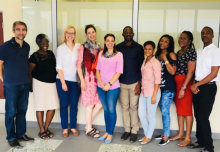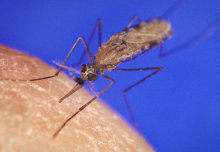

Not so hotspot
HIV ‘hotspots’ not necessarily major drivers of new infections
Areas of high HIV prevalence, known as ‘hotspots’, do not necessarily fuel the epidemic in the wider population, say researchers.



HIV ‘hotspots’ not necessarily major drivers of new infections
Areas of high HIV prevalence, known as ‘hotspots’, do not necessarily fuel the epidemic in the wider population, say researchers.


£795k award supports new African research partnership tackling drug-resistant TB
The funding, awarded as part of the MRC/DFID African Research Leader scheme, brings together researchers from Imperial and the University of Namibia.


New maths reveals how diseases progress and bacteria develop drug resistance
Scientists from Imperial and the University of Bergen have found a new way to predict how a disease will likely progress in individual patients.


Female mosquitoes that have mated are more likely to transmit malaria
Hormones received from male mosquitoes during mating boost the likelihood of female mosquitoes transmitting malaria to people.
 2
2


Flu shot can provide effective immunity for people living with HIV
People who are being treated for HIV can gain effective protection against seasonal flu with the influenza (flu) vaccine, new findings confirm.


A bird in the nest and moving to Mars: News from the College
Here’s a batch of fresh news and announcements from across Imperial.


Measles causes ‘immune amnesia’ leaving us vulnerable to other diseases
Scientists have shown how measles causes long-term damage to the immune system, leaving people vulnerable to other infections.


Vice-Dean recognised as International Fellow of the National Academy of Medicine
Professor Neil Ferguson has been elected as an International Member of the National Academy of Medicine.


Video
Imperial’s Horizon2020 projects showcase at European Researchers’ Night, London
The European Researchers’ Night was an energetic festival of scientific exploration at the Natural History Museum, London on the 27 September.


‘Poisoned arrowhead’ used by warring bacteria could lead to new antibiotics
A weapon bacteria use to vanquish their competitors could be copied to create new forms of antibiotics, according to Imperial College London research.
 1
1